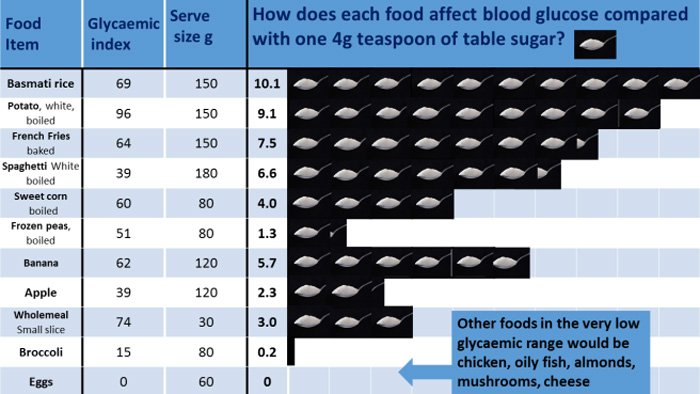What is a Low Carb Lifestyle?
The following basic principles underpin the low carb approach.
Reduce sugar intake to an absolute minimum
Sugar is spectacularly bad for your health, not just table sugar that you add to your food but hidden sugar in cakes, biscuits and processed foods.
Sugary fizzy drinks should not be consumed. Drinking one fizzy drink a day is estimated to add 6.75kg (over a stone) in weight per year to the average person.
You may be surprised to hear that “healthy” fruit juice is just as bad and should be kept to an absolute minimum. Fruit juice really is fruit with much of the good bits taken out and all the sugar left in.
Excess Sugar is turned straight into triglyceride (fat) in the liver.
Eat real food
What is real food? Real food is food as nature intended. It is best to cook with ingredients that have not been processed in a factory. Vegetables (especially the ones grown above ground but not potatoes), fruit (preferably grown in this country – but no grapes), meat, fish, cheese, eggs, nuts and full fat dairy are all good naturally healthy ingredients.
Avoid processed food
Have a look at this very informative article to dive straight into further detail about processed food.
What is processed food? Unfortunately, processed food appears to occupy at least 80% of supermarket shelves. As a rule of thumb, if it comes in a packet and there is a long list of ingredients, then it is worth considering buying something else instead.
Processed food is designed by large food companies to make maximum profit, have a long shelf life, usually packed with cheaply produced ultra-processed carbohydrates and unhealthy vegetable oils.
Reduce your starchy carbohydrate intake a lot
Remember starchy carbohydrates mainly consist of concentrated sugar. They are quickly broken down into sugar in your gut and can also cause inflammation.
Minimise your intake of starchy carbohydrates, in particular – minimise your intake of ALL bread (sorry that includes, “healthy” whole-grains), ALL cereals, potatoes, pasta and rice (brown or white).
Low Carb GP, Dr David Unwin, has produced some powerful “infographics” to illustrate how typical portions of common foods can contain a surprising number of teaspoons of sugar.

See more of Dr Unwin’s other infographic charts about the amount of hidden sugar in bread, cereals, some fruit fruit and veg. We have adapted these for our interactive "Sugraphics" in the Freshwell app.
We dig a little deeper into the science of carbohydrates in the science section found in the Going low carb area of our site.
Eat healthy fats
The good news is that meat, oily fish, cheese, eggs, full fat yoghurt, nuts, olive oil, coconut oil are full of natural healthy fats and they are good for you. You will need to eat more healthy fat to compensate for the reduced carbohydrate intake. This is the hardest message for people to understand, as it completely contradicts years of well-meaning but incorrect government misinformation, but it’s true!
Avoid vegetable oils
Olive oil is good for you, but avoid seed oils such as rapeseed oil, sunflower oil, safflower oil, soya oil, corn oil and margarine should be avoided. Eat butter instead.
Contrary to what we have been told over the last 40 years or so, seed oils are thought to cause inflammation and considered to be a major factor in a number of diseases by many scientists. Most fast food outlets tend to deep fry food in vegetable oils, or worse still, trans fats. Cooking with olive oil, butter or coconut oil is best. Here’s why seed oils should be avoided.
Avoid snacking
Our bodies are either on energy / fat burning or energy / fat storage mode. Every time we eat, our bodies switch to energy storage mode. If we eat three meals a day and snack between meals, our bodies are continually in storage mode throughout the waking hours, which is not good. See our time restricted eating section for further details.
Freshwell low carb resources
Different resources to suit different people’s learning style.
Go to Freshwell resources